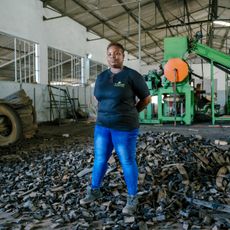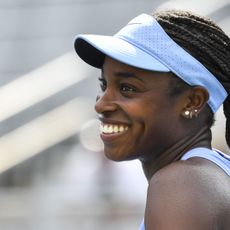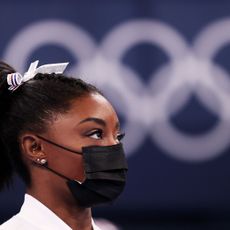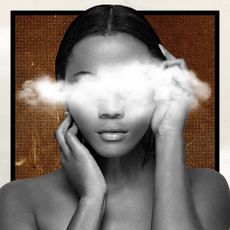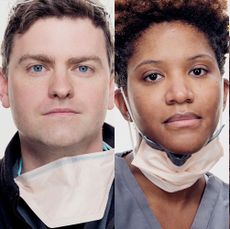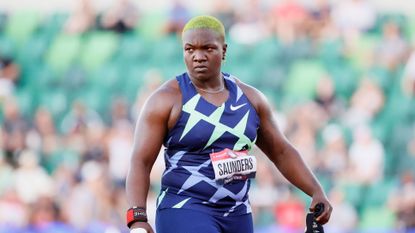

Celebrity news, beauty, fashion advice, and fascinating features, delivered straight to your inbox!
Thank you for signing up to . You will receive a verification email shortly.
There was a problem. Please refresh the page and try again.
Trigger warning: This article contains descriptions of suicidal ideation and depression.
The end of the highway had no railing. All Raven Saunders could see when she drove past it on her way to campus every day was a huge drop-off into an abyss. In her head, she had gone through all of the different scenarios for ending her life—pills, her .22 long rifle—but had never followed through. The depression came and went in waves, but one morning before school in 2018, two years after she placed fifth in the shot put at the 2016 Rio Olympics and seeped into a deep depression shortly after, it became too much. By 11 a.m., she finally forced herself out of bed and got in her car in a daze, thinking to herself, I don't even care anymore. She drove past all of the places she needed to go and headed toward that long highway in Oxford, Mississippi. The one with no railing.
"In my mind I was like, there's nobody that I can talk to. But I was like, I'll hit up my therapist and let her know where my mind is," explains Saunders. At that point, the then-21-year-old hadn't talked to that particular therapist for about eight months. (She'd found a new one since then, but hadn't seen that person for about three months.) The old therapist was the only person who knew about everything she was dealing with from school to relationships to her childhood—things some of the closest people in her life didn't even know. "I was like, if she doesn't respond or if it's the wrong number or whatever, then it really doesn't matter. Then I'll go ahead and do what I need." The way Saunders saw it, she had two options: Make a right before the intersection and go home, or make a left where the drop-off is. Her phone buzzed two stoplights before the turn.
In that life-changing text, the therapist assured Saunders she would get her the help she needed. Saunders went home and not long after, her assistant athletic director called, asking her to come into the office. "I remember going into the office, breaking down crying, and pretty much explaining a lot of stuff and how I was just like over everything. I didn't want to do this anymore," Saunders says. "They sent me to the hospital. And then from there, I went to my first mental health facility and I got some help."
Saunders started to understand more about herself, including certain memories she suppressed, and was able to face them in an environment where she didn't have outside distractions, like school or track or tying her performance to her worth. "I was very blessed and fortunate for that because I know that a lot of people may not have access to that or have a large support system that can get them the help they need before it's too late," says Saunders. "And that's really why I go so hard, especially behind mental health (opens in new tab)."
Her treatment eventually motivated her to start lifting and doing drills again in preparation for the next challenge: the Tokyo Olympics. Ahead of the Games, Marie Claire spoke with the 25-year-old athlete about finding her purpose in the off season, what she's looking forward to the most about the Games, and her advice for others struggling with their mental health.
Marie Claire: There's this misconception that people who struggle with their mental health can wake up, get help, and suddenly they’re okay again. And that's just not the case—your story is proof of that.
Raven Saunders: When a lot of people read my story or look it up it seems like, "Okay, I got help and now I'm healed." That's not the case because this journey is very difficult. I dealt with a depressive episode a few months ago that lasted about a month. The one before that lasted maybe two months. It definitely comes back. But now I know certain triggers or certain signs, like I'm not calling my parents as often as I should or not really going outside. If I'm constantly sitting in a dark room. Or just even with my emotions, like if I feel constantly drained. I learned certain things about myself in the midst of all the turmoil. It helps me come out of it faster or at least have the support around me. I don't feel like I'm dealing with my depression by myself.
MC: Many people struggle with tying their identity to their work or performance. How do you continue to excel at the sport you love without it defining you?
RS: I've always prided myself on being a hard worker, but also understanding that I have to have fun with it. That's why you'll see me dancing and things. I feel like I dance pretty much after every meet now. Good or bad. If it's too terrible, then I'm like eh, but I don't take it personally now. Beforehand, I would have sulked and sat on certain performances and things like that, but I've been able to brush certain performances off. And, in the good times, really embrace and enjoy them. Beforehand I'd be like, "What's next? What's next? What's next?" instead of appreciating being in the moment.
Before we're athletes, we're people. And it's just nice to see that there are more athletes, especially nowadays, that are taking care of their mental health.
MC: Was there ever a thought that you wouldn't compete in Tokyo once you decided to train for it towards the end of your stay in the mental health facility?
RS: No. Especially after I had my hip surgery [in 2019], I was really distraught because I was like, "Man, the Olympics are next year. I can't even walk on two crutches." I couldn't even sleep on my side or my stomach at that point. Once I started physical therapy, I just started attacking everything so hard because it's like, I have to do this. I have to get it done. Back in April, I actually tore my right labrum, so my opposite hip, and it's torn worse than what my left was. In that moment, it was weighing on me. But talking to some of my close friends, I remember calling one of them—Gwen Berry, actually. I called her and I broke down crying. But at the end of the conversation I was like, "I know God and the universe hasn't put me through everything I've been through just to stop me now." I feel like this is just another challenge that I have to overcome to get to what I say I want.
MC: Being on a high in Rio and then coming down from it afterwards, I imagine training again can be a little triggering. How are you managing your mental health currently? Do you have any fears about what will happen after Tokyo?
RS: I don't. And that's one of the things that I learned. I know my depression comes and goes, but I'm not focusing on when my next episode will be. If you're constantly looking over your shoulder, you're going to force something to happen. I do check-ins with myself on the daily or at least every other day, just making sure like, Are you good? How's your mental health?
I really feel like this time around, I'm in a so much better space mentally, physically. Especially sharing my story, there's so many more people now that know the trials that I deal with. And I have friends that from time to time are checking on me, like, "Hey, you good? Everything okay?" And then the friends that I am around, they've been able to sense when my depression comes. They can tell sometimes before I even can, like, "Okay, you're depressed." It's just nice having that type of support system.
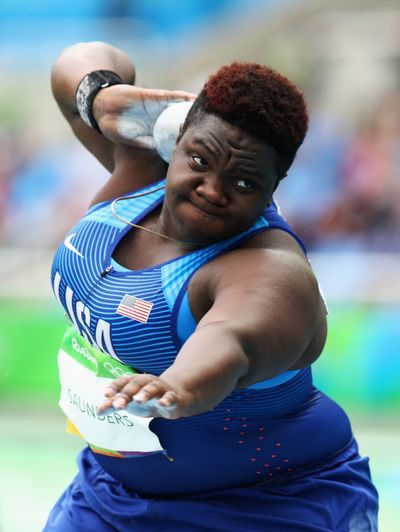
Saunders competing in the 2016 Rio Olympics.
MC: Recently, Naomi Osaka has advocated for better mental health care in the sports world and beyond. As a fellow athlete competing in Tokyo, what has it been like to see her speak out?
RS: Honestly, it really warmed my heart because Naomi has a broader reach than I have, especially on a world stage. And I was so happy that she had the courage to go against the grain. Also, being a Black athlete...like if this was 10 years ago, 15 years ago, and Serena [Williams] or Venus [Williams] was like, "Hey, I need a mental health break" they would have been dragged through the mud months on end. But I'm just happy that [Naomi] was able to take that time and still have enough support and love from the world, like, "Okay. Take that time for yourself, whatever. You have plenty more Grand Slams ahead of you." Before we're athletes, we're people. And it's just nice to see that there are more athletes, especially nowadays, that are taking care of their mental health.
MC: What are you most looking forward to in Tokyo?
RS: The experience this Olympics will be very un-Olympics like. I remember at Rio it was just like a huge...not necessarily a party, but it kinda was because you were around so many athletes all the time. You got to interact with everybody. You could just stop somebody and be like, "Hey, look. What sport do you do? What do you compete in?" And I feel like to a degree we'll have that. But there's going to be no spectators. There's going to be no friends or family. Even the coaches are limited. And there are so many athletes that even now have to go out and compete without their coach, without their family, and without fans, which is completely the opposite of what the Olympics has always been.
But what I'm looking forward to the most is the actual competition, because that's the biggest thing. I feel like it may be the best Olympics because, in all actuality, a lot of people will come in and treat it like a practice. It'll be a lot easier for certain people to put their best performances ahead because all year you're competing in front of fans and then you go to the biggest meet of the year and there's nobody. So you're just like, "Okay."
MC: For our readers who aren't familiar, can you tell them what the shot put entails?
RS: In the shot put for women, we throw a four-kilogram ball, which is roughly nine pounds. The men compete with a 16-pound ball, so almost double what we throw. There are a few different techniques to it. I'm a spinner. On the women's side, we have a lot more gliders. The glide is more of a linear movement. It looks like a spin, but there's also a lot of linear force that goes into it. It's not a beauty contest. It's not a judging contest. It's literally who can throw the furthest while staying in the ring. I think my throw takes about a second to a second and a half, if that.
MC: Any advice you'd give to fellow athletes who may be struggling with their mental health right now?
RS: The thing that I would tell them is to seek help, and that you sometimes have to make yourself uncomfortable. I know a lot of times when you're depressed, you feel alone and you don't understand certain things. But if you do the work and you continuously try while you're in the midst of your depression to do certain things and do different things, to push yourself and constantly give yourself positive affirmations. If you're feeling down and you're feeling depressed [remind yourself], "I am worthy." That's one of my favorite affirmations and I repeat those things three times over: I will succeed. I will succeed. I will succeed. I will win. I will win. I will win. Just constantly reaffirming yourself of your words so as your mind is constantly trying to beat you down, you can fight that.
If you or a loved one are in crisis or experiencing thoughts of suicide, text the Crisis Text Line (opens in new tab) (text HELLO to 741741) or call the National Suicide Prevention Lifeline (opens in new tab) at 1-800-273-TALK (8255). Both services are free and available 24 hours a day, seven days a week.
RELATED STORIES
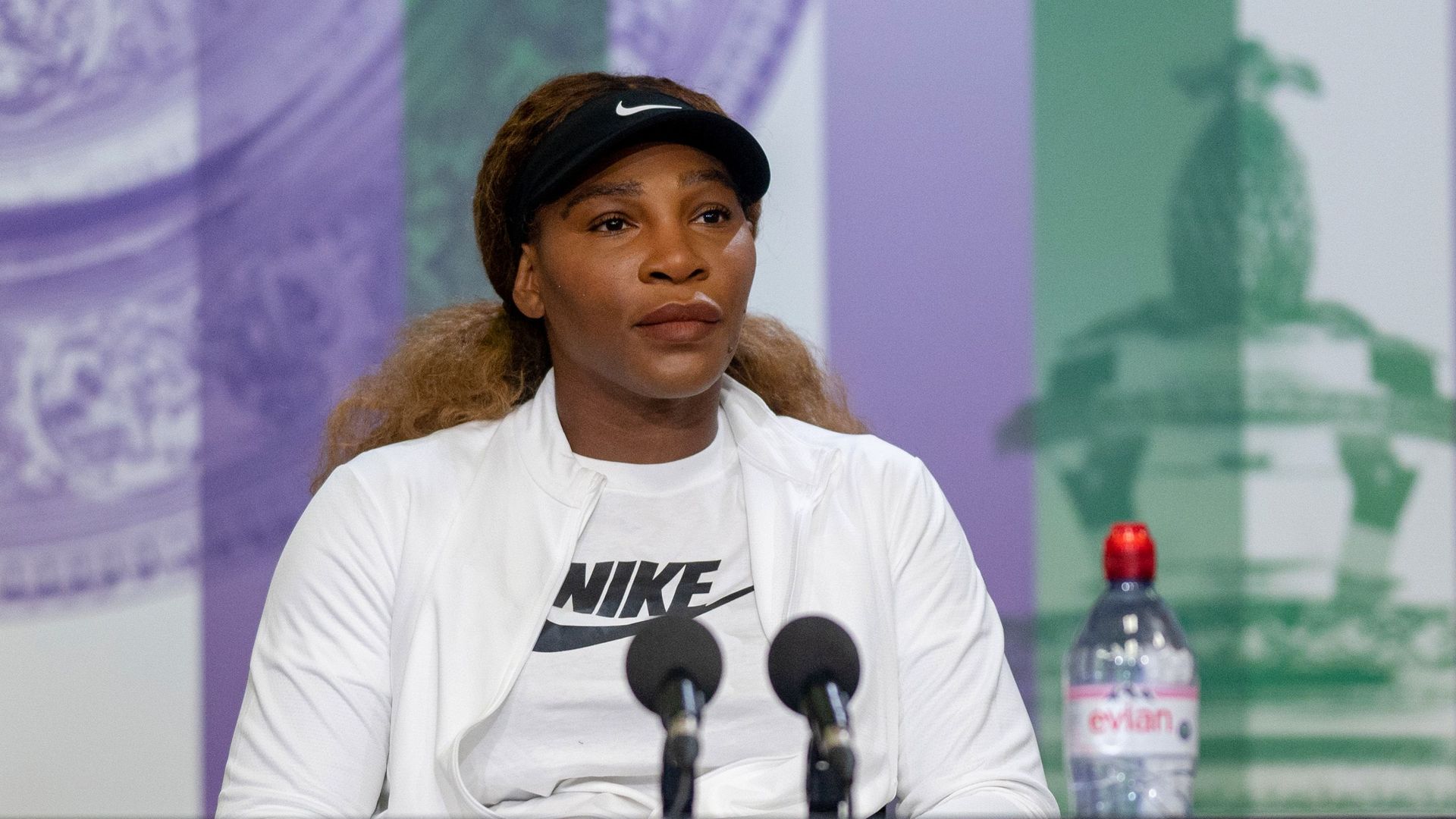
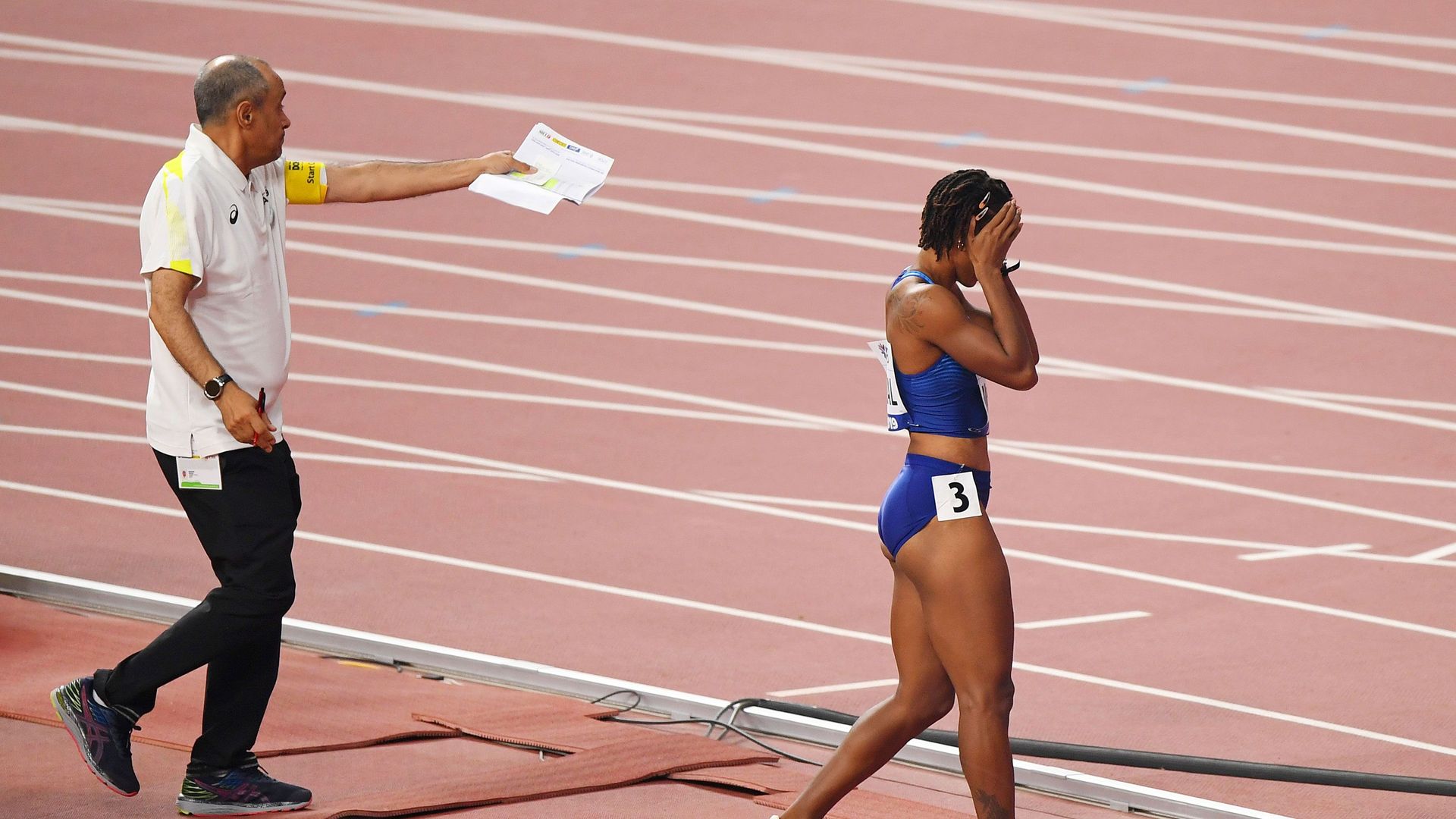

Rachel Epstein is an editor at Marie Claire, where she writes and edits culture, politics, and lifestyle stories ranging from op-eds to profiles to ambitious packages. She also manages the site’s virtual book club, #ReadWithMC. Offline, she’s likely watching a Heat game, finding a new coffee shop, or analyzing your cousin's birth chart—in no particular order.
-
 Want to Drink Like a College-Aged Prince William? That’ll Cost You £135
Want to Drink Like a College-Aged Prince William? That’ll Cost You £135Kate Middleton, for her part, liked a concoction called “Crack Baby.”
By Rachel Burchfield
-
 Neither Prince Charles Nor Prince William Have Reportedly Seen an Advance Copy of Prince Harry’s Tell-All Book
Neither Prince Charles Nor Prince William Have Reportedly Seen an Advance Copy of Prince Harry’s Tell-All BookThe manuscript has reportedly been signed off on by lawyers and is due on shelves this winter.
By Rachel Burchfield
-
 Melinda Gates Highlights 5 Women Inspiring Change in Their Communities
Melinda Gates Highlights 5 Women Inspiring Change in Their CommunitiesThe global advocate shares the stories of some extraordinary women whose vision and ingenuity are creating new possibilities for their countries and industries.
By Melinda French Gates
-
 U.S. Open Star Sloane Stephens Opens Up About Mental Health
U.S. Open Star Sloane Stephens Opens Up About Mental HealthThe tennis player and Mercedes-Benz ambassador is giving herself some grace—and, some pizza.
By Megan DiTrolio
-
 Simone Biles Is Out of the Team Final at the Tokyo Olympics
Simone Biles Is Out of the Team Final at the Tokyo OlympicsShe withdrew from the event due to a medical issue, according to USA Gymnastics.
By Rachel Epstein
-
 CeCe Telfer Has Already Made History
CeCe Telfer Has Already Made HistoryOlympics or not, the track athlete is changing the future of sports forever.
By Megan DiTrolio
-
 Transitioning in the Age of Zoom
Transitioning in the Age of ZoomRevealing changes in your gender presentation can be complicated when you haven’t seen family or coworkers in person in months.
By Lauren Rowello
-
 Centuries of Racism Have Created a Mental Health Crisis Among Black Americans
Centuries of Racism Have Created a Mental Health Crisis Among Black AmericansMarah Lidey, cofounder and co-CEO of wellness app Shine, shares how years of racism has significantly impacted the collective mental health of Black Americans—and how her own experiences inspired her to help others.
By Marah Lidey
-
 What If Fertility Didn't Have a Shelf Life?
What If Fertility Didn't Have a Shelf Life?Nicole Shanahan and Sergey Brin’s struggle to start a family launched a new era in scientific research. The goal: End menopause.
By Bonnie Rochman
-
 Hopeful, Proud, Tired: How Frontline Workers Feel Fighting the COVID-19 Crisis
Hopeful, Proud, Tired: How Frontline Workers Feel Fighting the COVID-19 CrisisA photographer shot and interviewed 17 New York City healthcare heroes working tirelessly to fight the coronavirus pandemic.
By Benedict Evans
-
 Death Surrounds Her
Death Surrounds HerEmily Rostkowski is an oncology nurse and cancer survivor herself. But now, like so many other healthcare workers, she spends her days in the center of the coronavirus storm.
By Erika Hayasaki


